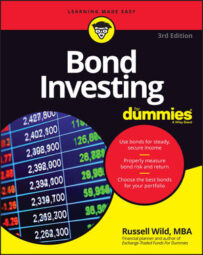Before you get into the nitty-gritty of buying and selling bonds, you need to make a decision between individual bonds and bond funds. Thanks to the many recent changes in the bond markets, either choice can be a good one. Still, most investors are better off, most of the time, with bond funds.
Many people prefer bond funds for a number of reasons, but far and away the largest reason is the diversification that bond funds allow.
Funds diversify away certain risks
The obvious appeal of going with a bond fund over individual bonds is the same as the appeal of going with stock funds over individual stocks: You get instant diversification.
If you build an entire portfolio of McDummy Corporation bonds (or stocks), and the McDummy Corporation springs a serious leak, you could take a serious hit on the McChin. With bond funds, you don’t need to worry so much about the crash of a particular company.
How much money should you be able to invest before you forget about bond funds and build a truly diversified bond portfolio out of individual bonds? Probably something in the range of $300,000.
Bond funds make investing a lot easier
Sure, you can own a boatload of individual bonds and ladder them (which means to use a diversification technique), but owning one or a handful of bond mutual or exchange-traded funds is often a lot simpler. Also, given the numbers, most people don’t have nearly enough money to diversify properly with individual bonds.
Individual bonds are also more work than bond funds. The interest payments generally come to you twice a year. If you reinvest that money rather than spend it, you need to decide how to reinvest.
In other words, a portfolio of individual bonds takes ongoing care and maintenance, sort of like an old car that needs to go to the shop every few months. Bond funds, in contrast, can be set up to reinvest automatically and can almost be put on autopilot.
Index funds and actively managed funds
If you wish to capture the gains of the entire bond market, bond index funds allow you to do that. If you want to bet (yes, it’s always something of a bet) that you can do better than the bond market at large, you can hire an active manager who tries to eke out extra returns for you by looking for special deals in the bond market.
Index investing is usually better (for both stocks and bonds) because beating the market is very hard to do. Study after study shows that index investors, in both equities and fixed income, wind up doing better than the vast majority of investors. That’s largely because index funds tend to be the least expensive funds. Index fund managers take less for themselves, and they incur far fewer trading costs.
Still, if you put the time and effort into finding the right active bond manager, and you pay that manager a modest fee, you may wind up ahead of the indexes. Just know the odds are against it. According to Morningstar, only 27 percent of actively managed bond funds have outperformed the Barclays Capital Aggregate Bond Index over the past 15 years, while many of them take on more risk than the index.
If you wish to try to beat the market using individual bonds, you may be able to find a really good bond broker who knows the markets inside and out and charges you only a reasonable markup for each trade or a reasonable flat fee for his services. Finding such a broker, however, is a lot more difficult than researching bond-fund managers. And most such talented brokers aren’t going to work with you if you have chump change to invest.
Keeping your costs to a minimum
For the savvy investor, the cost of trading individual bonds is cheaper than ever. But so, too, is the cost of investing in bond funds. Treasury bonds can be bought online (Treasury Direct) without any kind of fee or markup. Any other kind of bond, however, costs you something to trade. Given the volume that bond fund managers trade, they can often trade cheaper than you can.
If you pay a fund manager a pittance per year (such as the 12/100 of 1 percent that a Vanguard ETF manager receives), you are nearly always going to get off cheaper with the fund than with building your own bond ladder.
Note that popular wisdom has it that individual bond investing is cheaper than investing in bond funds. Don’t buy it. Except perhaps for Treasury bonds, and maybe new issues on agency bonds or municipals, the small investor dealing in individual bonds is unlikely to wind up ahead.
Many buyers of individual bonds often incur one frequently forgotten cost: the cost of having idle cash. If you collect your semiannual coupon payments and don’t spend them, they may sit around in a low-interest money market account.
Many clients, in their existing “bond” portfolios, have wads and wads of cash sitting around earning next to nothing. That doesn’t happen with bond funds, where the monthly interest can easily be set up to roll right back into the fund, earning money without pause.

